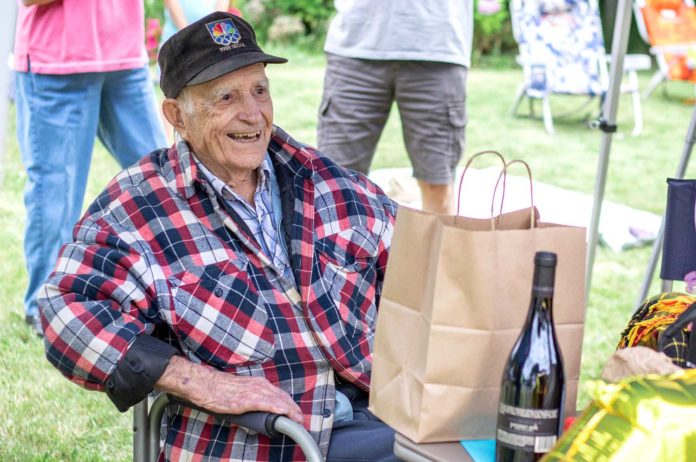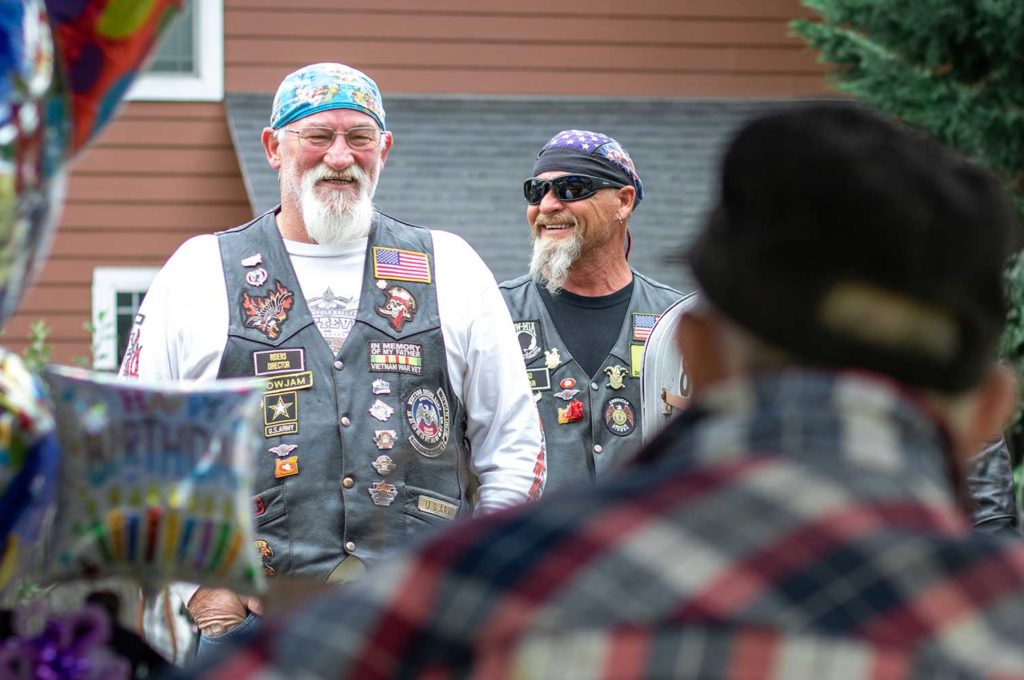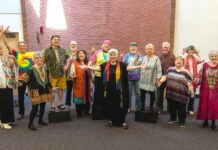
A World War II veteran and Tigard resident for some 70 years, Paul Herberholz marked his 100th birthday on June 25. To celebrate, his son Al planned a drive-by parade party with the city deciding to join in.
The Washington County sheriff’s department stopped by to chat and thank Herberholz for his 13 years of military service. Following was Tigard’s own police and fire department.
“It’s pretty busy. I heard ahead of time what was going to go on, but I didn’t think it was going to be quite so great. It was great – all of it. It really couldn’t have been any nicer,” Paul Herberholz said.
Along with the city and county departments, family and friends drove by, blowing their horns and cheering out of their windows to recognize the momentous feat. Flowers were thrown and letters were dropped off as Herberholz waved to each and every well-wisher.
The Tigard Legion Riders, a motorcycle club associated with the American Legion veterans organization, roared by on their bikes to honor Herberholz, a former American Legion member.
“Nothing like this has happened before and we never get to see any of these people, so it’s truly wonderful that they could all stop by and celebrate him,” Herberholz’s daughter, Katherine Brunner, said.

Herberholz was born and raised in North Dakota. He moved to Oregon when he was 16. Two years later, in 1938, he joined the U.S. Army. He was stationed at Fort Stevens in Hammond for training.
He traveled to California to finish most of his training and was then shipped to Alaska on assignment to build some of the first airstrips. From Alaska, he went to Texas, and due to his German background, he helped interrogate some of the German prisoners as an interpreter at Fort Hood. Still, his movement through the war was only beginning.
“He was put on a transport ship and sent to the Philippines,” Brunner said. “He was part of the 116th combat engineers that liberated Leyte. You hear all about the other stuff, but Leyte was a big battle. He was hunkering down in the forests, in the water and in the mountains.”
Son Al Herberholz had said that this was where his father received the Purple Heart after being blown out of a foxhole. Despite this, his war still wasn’t quite over. Only three weeks after the atomic bomb dubbed Little Boy was dropped on Hiroshima, Japan, Herberholz was transported to secure and clean up, despite the radiation.
“He remembered driving trucks and all his guys were getting out in Hiroshima and he said, ‘I wasn’t getting out. I was scared to death.’ So, he had the common sense over there,” Brunner said.
Once he finished up in Japan in 1945, he was sent back to Oregon where he married his late wife, Anna Wayer, and moved into the small town of Sherwood. Herberholz kept himself involved in the local community, taking part in the original Robin Hood and His Merry Men of Sherwood while having his first daughter, Katherine.
After living in Sherwood for six years, Herberholz, who worked as an electrician following the war, moved to Tigard, where he had two more children and still resides.
Over the decades, he has seen Tigard grow from a small rural community to the city it is today.
In 1951, he bought a double-decker shack on three acres off of Rural Way 2 and OR-217 (now Pfaffle St. and Hall Blvd.) which expanded back to where OR-217 exists today.
He built the current house in 1955 using much of his trade skills from his career as an electrician. He began with Reider Electric and Mike’s Electric until starting his own business: Herberholz Electric.
Brunner says that Paul was always known for helping his community, and when he wasn’t, he still found a way to be involved.
“Dad, he was awesome. Sometimes he had to work two jobs to send us to private school. Then he’d come home and work in the yard or butcher rabbits, as that was a secondary income. I seriously don’t know how he did it,” Brunner said. “I really think that if it wasn’t for the Robin Hoods and all of the extracurriculars that kept himself busy, he probably wouldn’t have made it this far.”





















